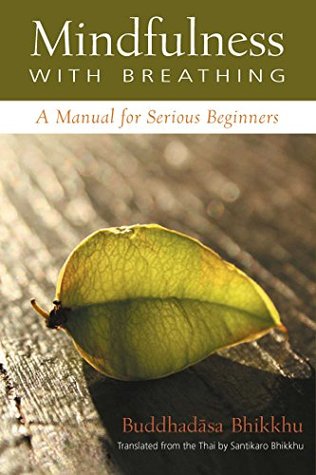Kindle Notes & Highlights
ānāpānasati.
This is why we have studied and explained the sixteen-step method in full, because it will reveal the secrets of nature through its scientific approach. This is a science that leads to a natural understanding of kāya, vedanā, citta, and Dhamma, in the best and most complete way possible, through the perspective and approach of natural science.
aniccaṁ-dukkhaṁ-anattā—
First, get to know that activity from all angles (long-short may or may not be relevant). Second, see what influence that activity has on the flesh-body. Third, find the right way to perform that activity so that it has the optimal effect on the body and allows the mind to find an appropriate degree and type of concentration. This corresponds to the first tetrad (kāya).
Next, examine the feelings associated with that activity, especially the pleasant feelings that arise when the activity is done well and successfully. Study the influence these feelings have on the mind, then calm that influence. This covers the second tetrad (vedanā).
The third tetrad (citta) begins with experiencing the different types of mind that arise during that activity. Then we train to gladden, concentrate, and liberate ...
This highlight has been truncated due to consecutive passage length restrictions.
Finally, the fourth and most important tetrad (Dhamma) is to contemplate all aspects of that activity—body, feeling, and mind—as aniccaṁ, dukkhaṁ, and anattā. Contemplate the fading away and extinction of attachment. Contemplate the tossing ...
This highlight has been truncated due to consecutive passage length restrictions.
the first and last tetrads—are enough meditation theory to eliminate dukkha from life. May you use them well.
having sat cross-legged with his body erect, securely maintains mindfulness (sati). Ever mindful, that bhikkhu breathes in; ever mindful, he breathes out.”
(1) “While breathing in long, he fully comprehends, ‘I breathe in long.’ While breathing out long, he fully comprehends, ‘I breathe out long.’35 (2) “While breathing in short, he fully comprehends, ‘I breathe in short.’ While breathing out short, he fully comprehends, ‘I breathe out short.’ (3) “He trains himself, ‘Thoroughly experiencing all bodies, I shall breathe in.’ He trains himself, ‘Thoroughly experiencing all bodies, I shall breathe out.’36 (4) “He trains himself, ‘Calming the body-conditioner, I shall breathe in.’ He trains himself, ‘Calming the body-conditioner, I shall breathe
...more
(5) “He trains himself, ‘Thoroughly experiencing pīti, I shall breathe in.’ He trains himself, ‘Thoroughly experiencing pīti, I shall breathe out.’ (6) “He trains himself, ‘Thoroughly experiencing sukha, I shall breathe in.’ He trains himself, ‘Thoroughly experiencing sukha, I shall breathe out.’ (7) “He trains himself, ‘Thoroughly experiencing the mind-conditioner, I shall breathe in.’ He trains himself, ‘Thoroughly experiencing the mind-conditioner, I shall breathe out.’38 (8) “He trains himself, ‘Calming the mind-conditioner, I shall breathe in.’ He trains himself, ‘Calming the
...more
(9) “He trains himself, ‘Thoroughly experiencing the mind, I shall breathe in.’ He trains himself, ‘Thoroughly experiencing the mind, I shall breathe out.’40 (10) “He trains himself, ‘Gladdening the mind, I shall breathe in.’ He trains himself, ‘Gladdening the mind, I shall breathe out.’41 (11) “He trains himself, ‘Concentrating the mind, I shall breathe in.’ He trains himself, ‘Concentrating the mind, I shall breathe out.’42 (12) “He trains himself, ‘Liberating the mind, I shall breathe in.’ He trains himself, ‘Liberating the mind, I shall breathe out.’”43
(13) “He trains himself, ‘Constantly contemplating impermanence, I shall breathe in.’ He trains himself, ‘Constantly contemplating impermanence, I shall breathe out.’44 (14) “He trains himself, ‘Constantly contemplating fading away, I shall breathe in.’ He trains himself, ‘Constantly contemplating fading away, I shall breathe out.’45 (15) “He trains himself, ‘Constantly contemplating quenching, I shall breathe in.’ He trains himself, ‘Constantly contemplating quenching, I shall breathe out.’46 (16) “He trains himself, ‘Constantly contemplating tossing back, I shall breathe in.’ He trains
...more
whenever non-sensual pīti arises in the bhikkhu who has engaged energy, then the contentment factor of awakening (pītisambojjhaṅga) is engaged by that bhikkhu; he develops it further and its development in him is perfected. When that bhikkhu’s mind is contented, both body is calmed and mind is calmed.


